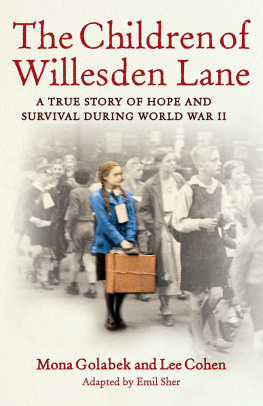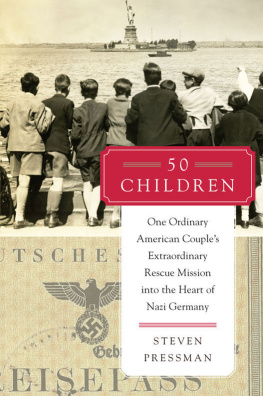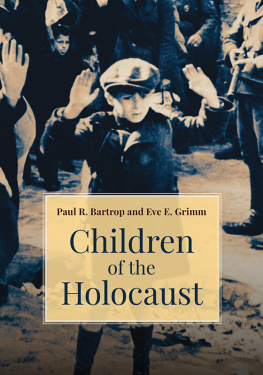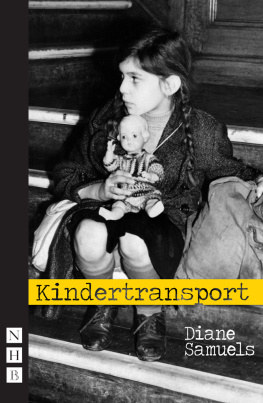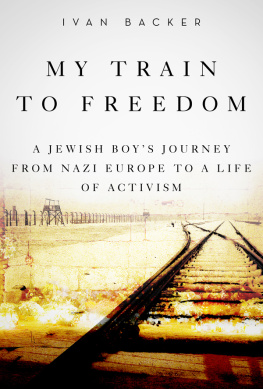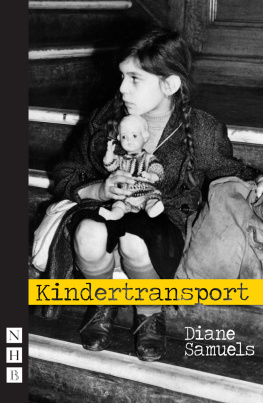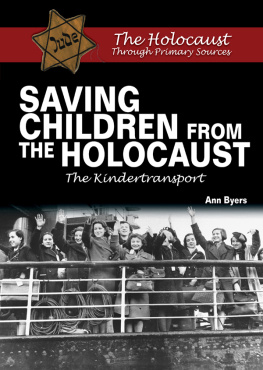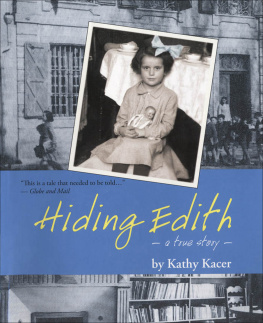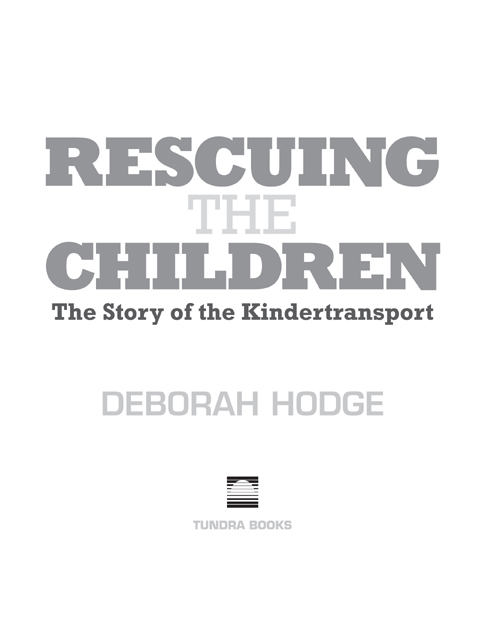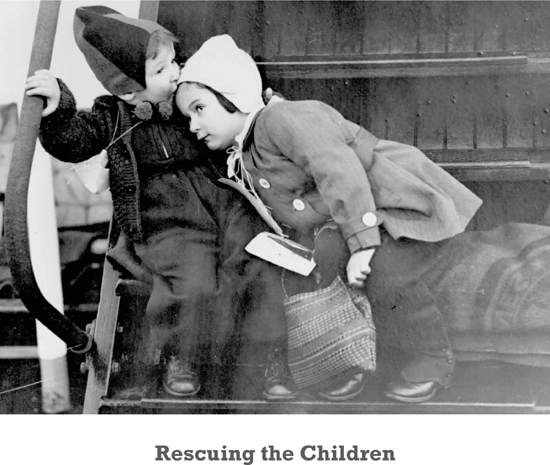
Text copyright 2012 by Deborah Hodge
Published in Canada by Tundra Books, a division of Random House of Canada Limited,
One Toronto Street, Suite 300, Toronto, Ontario M5C 2V6
Published in the United States by Tundra Books of Northern New York,
P.O. Box 1030, Plattsburgh, New York 12901
Library of Congress Control Number: 2011938776
All rights reserved. The use of any part of this publication reproduced, transmitted in any form or by any means, electronic, mechanical, photocopying, recording, or otherwise, or stored in a retrieval system, without the prior written consent of the publisher or, in case of photocopying or other reprographic copying, a licence from the Canadian Copyright Licensing Agency is an infringement of the copyright law.
Library and Archives Canada Cataloguing in Publication
Hodge, Deborah
Rescuing the children : the story of the Kindertransport / by Deborah Hodge.
Includes index.
eISBN: 978-1-77049-366-7
1. World War, 1939-1945 Jews Rescue-Juvenile literature. 2. Kindertransports (Rescue operations) Juvenile literature. 3. Jewish children in the Holocaust Juvenile literature. 4. Refugee children Biography Juvenile literature.
5. Jewish refugees Biography Juvenile literature. I. Title.
D804.6.H63 2012 j940.531835083 C2011-906508-8
We acknowledge the financial support of the Government of Canada through the Canada Book Fund and that of the Government of Ontario through the Ontario Media Development Corporations Ontario Book Initiative. We further acknowledge the support of the Canada Council for the Arts and the Ontario Arts Council for our publishing program.

v3.1
For the Kinder and their families,
in remembrance of the past and with hope for the future.
CONTENTS
FOREWORD BY IRENE N. WATTS
Irene N. Watts (formerly Irene Kirstein) was seven years old when she left Berlin on the Kindertransport.
Throughout history, even in the worst of times, stories of exceptional courage have come to light. An individual or a small group of people hides someone who is in danger from the enemy. Another in need is led across a heavily guarded frontier. A piece of bread is handed to a starving child.
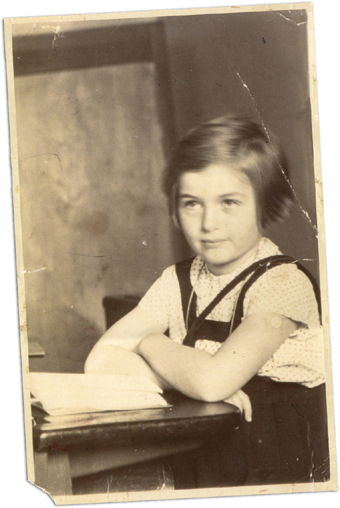
Irene Kirstein (now Irene N. Watts) at school in Berlin a year before she left on the Kindertransport.
Deborah Hodges book tells us about not just a few instances but of many, of ten thousand children who were saved. We read of exceptional acts of kindness, devotion, and bravery that allowed the rescue to happen. It is a story of an exodus of hope for survival, at a time when an entire people were in despair.
Why were the children at risk? What made parents send their children to strangers? What happened to the children after they fled? This is the story that Deborah Hodge felt compelled to write, and she has done so with insight, accuracy, and compassion.
Remembering those years, they seem like a tale written by the Brothers Grimm:
Once upon a time there was a country ruled by a wicked tyrant. He was filled with hatred for anything and anyone he considered to be non-Aryan.
Most of all he hated the Jews. Their right to exist was in peril. He passed laws against them that took away every right all of us today take for granted.
Even their choice of names was denied them: Jews were forced to change their names to Sara or Israel, another way the Nazis singled them out for humiliation and punishment. Jewish means of livelihood were taken away. Their children became outcasts; they were expelled from school and forbidden to take part in normal activities, such as walking in the park, playing games, and seeing a movie. Adults were imprisoned arbitrarily their every moment was lived overshadowed by danger.
I was born two years before Hitler came to power. I did not fully understand the fear that filled the streets, the tension and whispers in my home. Why did my mother make me stay home from kindergarten, why wasnt I allowed to see the latest Shirley Temple movie, why did I have to hide my Star of David necklace when we went out?
My father was arrested and sent to Sachsenhausen concentration camp. The fathers of my Jewish friends were taken away, too. When my father was released, I was afraid. I hardly recognized him. He sat in his chair and looked so old and thin. His hair had turned white, but there was only stubble showing because his head had been shaved.
Soon after his return, my mother said I was going to England, going on a holiday, by train and boat. Because I was a big girl now, seven and a half, she would let me travel by myself. She had a blue silk ankle-length party dress made for me. Maybe I would be invited to have tea with the little English princesses at Buckingham Palace?
When we got to the station very early on the morning of December 10, 1938, I was surprised to see so many children going on holiday too. Why were the grown-ups crying? I didnt cry I was thrilled about my holiday. As soon as the train pulled out of the station, I took off my long, scratchy stockings. Mother had made me wear three pairs of underwear because, she said, England was cold in December.
The reality of the parting did not sink in until I reached London. I looked for my mother on the platform, but she wasnt there. That moment is still fresh in my mind. She had lied because it was the only way she could bear to send me away.
You will read of many other Kinder and their experiences, but we all have something in common: we are grateful for the new lives we were given.
The memories of those so long-ago days have grown faded put away in the small suitcases we carried. Rescuing the Children: The Story of the Kindertransport makes sure that for future generations they will not fade. We will not be forgotten.
Irene N. Watts
THE CHILDRENS RESCUE
Over seventy years ago, nine months before World War II, Irene Kirstein boarded a train in Berlin, Germany, and traveled to England without her parents. She was just seven years old.
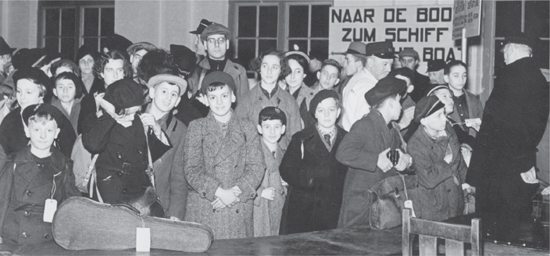
Some of the ten thousand children who were saved by the Kindertransport.
Irene was one of the nearly ten thousand Jewish children who were saved from almost certain death at the hands of the Nazis. These children were rescued by compassionate people who organized the Kindertransport rescue mission and by the parents who let their children go. (The word Kindertransport comes from Kinder, the German word for children, and


